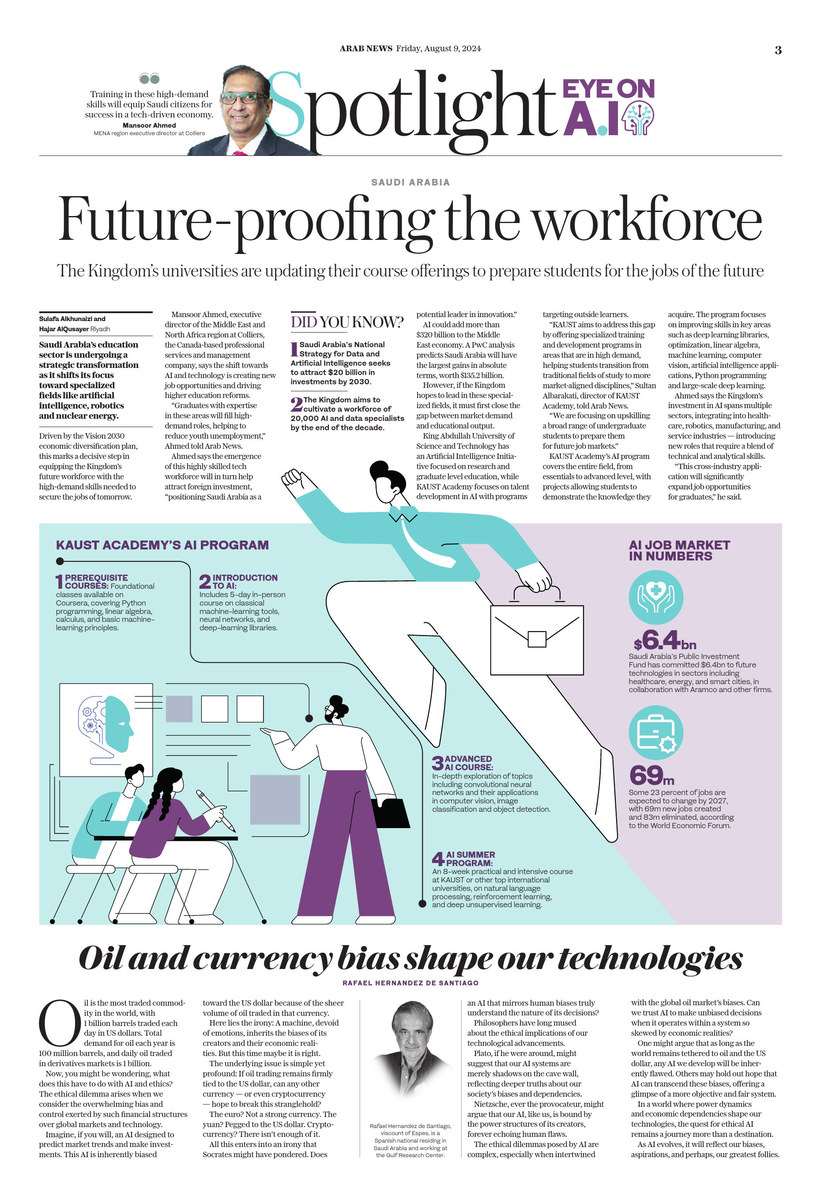Oil and currency bias shape our technologies

https://arab.news/n647f
In the bustling metropolis of Techville, where innovation never sleeps and ethics occasionally gets a caffeine boost, the latest debate has everyone buzzing.
This time, it is not about the next killer app or the latest in wearable tech, but something far more profound and perplexing: Artificial intelligence and ethics.
And at the heart of this conversation is the ever-eloquent John Bright, whose insights are as sharp as his tongue.
Bright, a figure known for his unfiltered views, recently opened a can of worms — or perhaps a barrel of oil — on the subject.
“You tell me, you read this rubbish. Oil is the most traded commodity in the world. 1 billion barrels are traded each day in US dollars. You think anyone is ready to change that?” Bright declares with the certainty of a seasoned tech prophet.
“Total demand for oil each year is 100 million barrels, and daily oil traded in derivatives markets is 1 billion. There is no such currency to sustain these volumes.”
Now, you might be wondering, what does all this have to do with AI and ethics? In Techville, everything is connected — sometimes by a mere line of code.
The ethical dilemma arises when we consider the overwhelming bias and control exerted by such financial structures over global markets and technology.
Imagine, if you will, an AI developed in Techville. It is designed to predict market trends and make investments. This AI, despite its impressive algorithms, is inherently biased toward the US dollar because of the sheer volume of oil traded in that currency.
Here lies the irony: A machine, devoid of emotions, inherits the biases of its creators and their economic realities.
But this time maybe it is right.
Techville’s residents, always keen on a good debate, have taken this statement to heart. The underlying issue is simple yet profound: If oil trading remains firmly tied to the US dollar, can any other currency — or even cryptocurrency — hope to break this stranglehold?
Bright’s dismissive view of alternative currencies adds fuel to the fire. “The euro? Not a strong currency. The yuan? Pegged to the US dollar. Cryptocurrency? There isn’t enough of it.”
All this enters into an irony that Socrates might have pondered. “Does an AI that mirrors human biases truly understand the nature of its decisions?”
Bright, ever the pragmatist, does not shy away from highlighting these biases. His point? Even the mightiest have vulnerabilities, and the structures we rely on are far more fragile than we care to admit.
Can we trust AI to make unbiased decisions when it operates within a system so skewed by economic realities?
Rafael Hernandez de Santiago
Philosophers have long mused about the ethical implications of our technological advancements.
Plato, if he were around, might suggest that our AI systems are merely shadows on the cave wall, reflecting deeper truths about our society’s biases and dependencies.
Nietzsche, ever the provocateur, might argue that our AI, like us, is bound by the power structures of its creators, forever echoing human flaws.
In Techville, these philosophical musings are not just academic exercises; they have real-world implications. The ethical dilemmas posed by AI are complex, especially when intertwined with the global oil market’s biases.
Can we trust AI to make unbiased decisions when it operates within a system so skewed by economic realities?
The city’s thinkers are deeply divided on this issue. Some argue that as long as the world remains tethered to oil and the US dollar, any AI we develop will be inherently flawed.
Others hold out hope that AI can transcend these biases, offering a glimpse of a more objective and fair system. It is a debate reminiscent of Descartes’ quest for certainty in a world of doubt.
Bright, with his characteristic wit, brings us back to earth.
“X is not doing great, collapsed real estate, collapsed financial and banking sector, low birth rate and declining population. Their stock market collapsed, etc. And they’re being attacked everywhere with their exports of electric vehicles and raising tariffs.”
So, where does this leave Techville’s AI ethics debate? In a state of perpetual irony, humor, and serious contemplation. The city’s brightest minds continue to grapple with these questions, knowing that the answers are as elusive as ever.
In a world where power dynamics and economic dependencies shape our technologies, the quest for ethical AI remains a journey more than a destination.
Bright, with his razor-sharp insights, ensures that the conversation stays both lively and grounded. He will undoubtedly remain at the forefront, reminding us all that while technology may advance, the ethical dilemmas it poses are as old as humanity itself.
As AI evolves, it will reflect our biases, aspirations, and perhaps, our greatest follies.
In Techville, where the future is always just a line of code away, the debate rages on, a testament to humanity’s enduring struggle to reconcile innovation with ethics.
• Rafael Hernandez de Santiago, viscount of Espes, is a Spanish national residing in Saudi Arabia and working at the Gulf Research Center.























